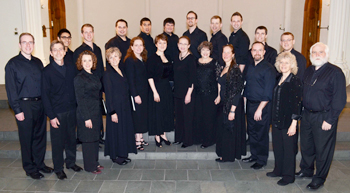By Daniel Hathaway

Duffin led off with his own four-part arrangement of The Star-Spangled Banner, probably the first time most members of the audience had heard — or even been aware of — all four of its stanzas. The arrangement was artful even if some of Francis Scott Key’s verse is overwrought (and lines like Their blood has wash’d out their foul footstep’s pollution challenged the normally admirable diction of the group).
The antebellum first half of the program included stern Puritan psalms from The Bay Psalm Book nicely softened and varied by Duffin’s arrangements, a set by William Billings and his circle that included the well-known round, When Jesus wept, and I am the Rose of Sharon, plus two amusing choruses about music-making, Daniel Read’s Down steers the bass, and Billings’s Modern Music.
Lowell Mason’s expressive O look to Golgatha from 1843 with its Bach chorale-like ending was a real find, and William Walker’s 1847, three-part version of Amazing Grace provides an attractive alternative — with its near-Shape Note harmonies — to the versions we usually hear. Duffin effectively “orchestrated” it to alternate male and female voices and solos.
Lovely, sentimental settings of Flow gently, sweet Afton (Burns) by Spilman and Warren and Stephen Foster’s Come where my love lies dreaming (with the sopranos deployed in the organ gallery) opened the second half and lead to Duffin’s next Real Find, Oliver Wendell Holmes’s 1869 Peace Prayer, set to a sophisticated hymn-like tune by Matthias Keller (and originally sung by 10,000 voices at a Jubilee in Boston celebrating the end of the Civil War).
Cleveland composer Patty Stair (1868-1926) was acknowledged by her Minuet for women’s voices and So sweet is she for men’s, both charming pieces that should find their way into the repertoire of single-sex glee clubs. Amy Beach’s Shakespeare setting Through the house give glimmering light (women) and “Edgar Thorn’s” (aka Edward MacDowell) The Witch (men’s voices) should win more modern performances as well.
The nearly two-hour concert ended with Oberlin and Harvard graduate R. Nathaniel Dett’s imaginative, multi-sectioned “Motet, on a Negro Folk Song Motif,” Don’t be weary, traveller, and Dudley Buck’s earnest and learned setting of Karl Christian Ernst Graf von Bentzel Sternau’s Hymn to Music.
Ross Duffin created a rich banquet of song for this concert. Quire stepped up to the table with a hearty appetite and sang through its multiple courses with thorough professionalism and admirable stamina. And there was dessert: Quire spread out to the four corners of the audience for a sing-a-long reprise of When Jesus wept. An odd way to end, but fun.
Published on ClevelandClassical.com April 8, 2014
Click here for a printable version of this article.
Return to the website.


